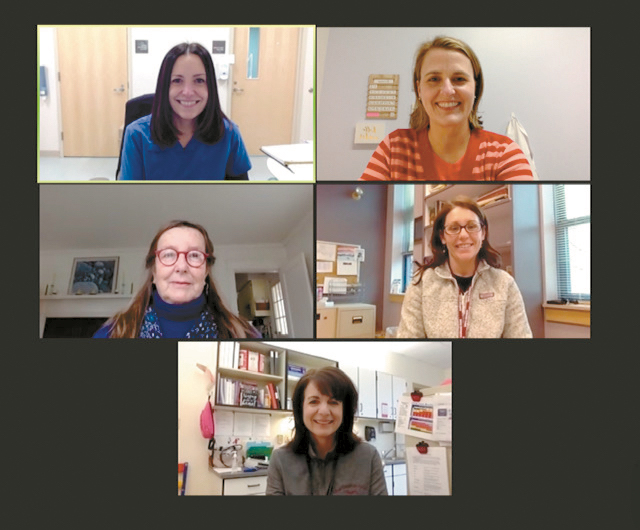The school nurse is often thought of as the person whose office is a welcoming place, where a student is treated for a playground scrape or comforted when they get sick at school. But nurses have many more professional and record-keeping duties in a normal school year. And since last spring, Gorham school nurses have taken on new and expanded responsibilities in the district’s efforts to mitigate the spread of COVID-19.
The three elementary school nurses, Collette Andreasen of Narragansett, Carrie Chase of Village, and Melissa Tringali of Great Falls, along with Alicia Murray from Gorham Middle School (GMS) and Joyce LaRou from Gorham High School (GHS), spoke about their experiences working in this unique situation.
A student who has tested positive for COVID or has been identified as a close contact cannot return to school until they test negative or the quarantine period is over. “With K-5 students I have a lot more communication with parents by phone and email about absences,” Andreasen said. “I have much more desk time, but with only one-half of students in school at a time there is not as much recess, so fewer ice packs for minor injuries.”
Students are screened for symptoms every day before coming to school. Tringali said, “We are very strict about screening, so there may be even fewer kids in school.”
Chase agreed, but added, “We are just as busy because there is an increase in communication educating parents and students about COVID.

Decisions about when to quarantine are made by the Maine Center for Disease and Prevention (CDC), not by nurses or administrators, but the nurses have responsibility for explaining the regulations. “Parents don’t always understand when students have symptoms,” Andreasen said. “Nothing is ‘just a cold,’ and it is difficult for parents who don’t always remember when the student first had symptoms.”
Tringali added, “However, for every rule there is a situation that does not fit and the guidelines change often.”
In addition, for privacy concerns nurses cannot give out as much information as parents want. “We err on the side of caution,” Andreasen said. “Our goal is to mediate spread and we see things parents don’t.”
Tringali agreed, “But parents are getting better at the routines, and the kids have the routines down.” All agreed that students are very cooperative in mask wearing, hand washing, and keeping a safe distance, but they don’t like missing school. Fortunately, when a student can’t attend school there is usually one parent working from home. “But students don’t like that they have to get a doctor’s clearance and wait for test results before coming back,” Tringali said.
“K-5 students like a set schedule and structure,” Andreasen said, “and they worry some about if they have symptoms.”
The nurses at GMS and GHS see more student anxiety. “I have only been a month on the job,” Murray said, “but I have seen palatable anxiety. It is difficult for middle school students to be isolated from their peers.”
LaRou agreed and added that she was very worried about students’ mental health. “There is a huge amount of anxiety and depression,” she said. “If sports were closed down again it would be a big letdown for students.”
All agreed they could not do the job in this situation without each other. “We talk with colleagues every day and talk out our frustrations,” Andreasen said. “We abide by the same rules. Some days are very hard, which is common for most professionals in this time.”
Tringali added, “We work as a team and are all on the same page.”
Chasse agreed, “There are days when we feel overwhelmed managing the concerns of students, staff, and parents. We appreciate the constant support and communication with administration.”
“There is an emphasis in Gorham on inter-school cooperation,” Tringali said.
Andreasen added that “Gorham is a good, small town with lots of parental involvement in the schools.” But she spoke for all five nurses when she said, “I’ll be glad when we wrap this up.”


